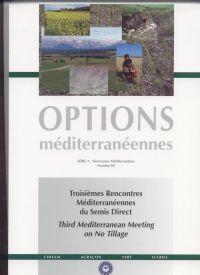| Article précédent | p. 167-171 | Article suivant |
The benefits of direct drilling on a farm in the Alentejo (Portugal)
The present work shows the positive modifications obtained on a farm in the Alentejo, in the south of Portugal after 4 years of direct drilling. The soils in the study area are Luvisols, characterized by poor structure, bad internal drainage and cumulative negative effects of conventional soil tillage. The effects resulted in a reduction of erosion and soil compaction and improved physical, chemical and biological characteristics of the soil. This allowed a deeper root growth, higher infiltration rate and better soil bearing capacity. This promoted the opportunities for applying nitrogen and herbicides. All together enhanced crop growth. A significant reduction was reported in the number of tractors and soil tillage equipment, and also in the maintenance, repair and labour costs. Pulses were introduced in rotation with winter cereals, and the farm adopted other practices, such as the maintenance of straw on the soil surface and the utilization of special equipment for soil conservation. Despite the complete change regarding the soil management system, it was possible to maintain the perfect integration of animal and crop production in the farming system, using crop residues only partially for animal feeding.
- [ Afficher ]
- [ Télécharger ]
- [ Exporter la citation ]
Vous pouvez télécharger la citation au format :
- [ Imprimer ]
-
Mots-clés
PORTUGAL, SEMIS DIRECTCiter cet article
Freixial R. The benefits of direct drilling on a farm in the Alentejo (Portugal). In : Arrue Ugarte J.L. (ed.), Cantero-Martínez C. (ed.). Troisièmes rencontres méditerranéennes du semis direct . Zaragoza : CIHEAM, 2006. p. 167-171. (Options Méditerranéennes : Série A. Séminaires Méditerranéens; n. 69). 3. Mediterranean Meeting on no Tillage, 2006/03/23-25, Zaragoza (Spain). http://om.ciheam.org/om/pdf/a69/06600101.pdf



